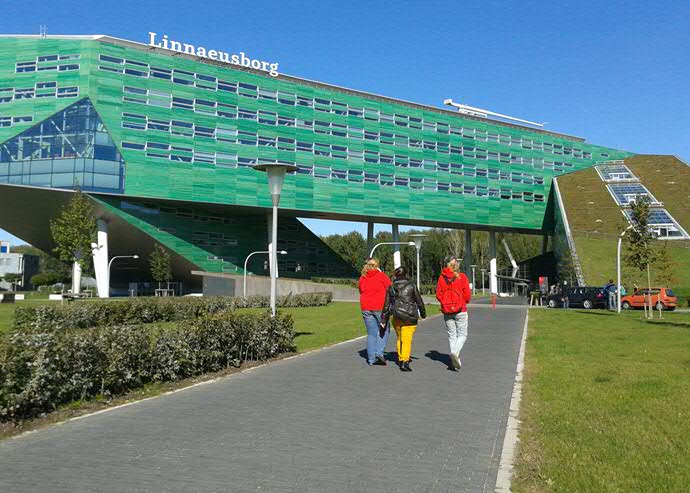Nieuw onderzoekinstituut GELIFES zet aanpassing van levende systemen centraal

Vandaag, woensdag 22 april markeert een openingssymposium de start van het nieuwe onderzoekinstituut GELIFES. Het ‘Groningen Institute for Evolutionary Life Sciences’ brengt de ecologische, evolutionaire en neurowetenschappelijke onderzoeksgroepen van de faculteit Wiskunde en Natuurwetenschappen bij elkaar. Samen onderzoeken ze de wisselwerking tussen evolutionaire aanpassingen en veranderingen tijdens de ontwikkeling of het ouder worden van organismen, en de invloed die dit heeft op natuur, voedselproductie en gezondheid.
‘Aanpassing is een centraal kenmerk van alle levende systemen’, legt wetenschappelijk directeur en hoogleraar gedragsbiologie Ton Groothuis uit. Al het leven is gevormd door evolutie, waarbij de best aangepaste individuen overleefden. Dit uitgangspunt leidt tot het opnieuw bekijken van eigenschappen die niet aangepast lijken. ‘Ziekten zijn vaak het gevolg van een mismatch tussen de condities waaraan een organisme is aangepast en de huidige levensomgeving’, legt Groothuis uit.

Gericht zoeken naar een oplossing
Mensen zijn bijvoorbeeld geëvolueerd in omstandigheden met een sterk wisselend voedselaanbod, waarbij ze zich lichamelijk flink moesten inspannen. De huidige overdaad in de Westerse wereld en ons zittende bestaan zorgt dan ook voor een epidemie van overgewicht. ‘Pas wanneer je weet waarvoor evolutie ons geprogrammeerd heeft, kun je gericht gaan zoeken naar de oplossing.’
RUG steekt 35 miljoen in onderwijs en onderzoek
De Rijksuniversiteit Groningen (RUG) investeert 35 miljoen euro in onderwijs en onderzoek. Alle faculteiten van de RUG mochten in juni vorig jaar ideeën of projecten inleveren bij het universiteitsbestuur, om aanspraak te maken op een deel van het geld. De voorwaarde: de voorstellen moeten het onderwijs en onderzoek aan de universiteit verbeteren. Van de 53 ingediende plannen, zijn er nu 28 voorlopig goedgekeurd door het universiteitsbestuur. Ze passen zoveel mogelijk binnen onze maatschappelijke thema’s Healthy Ageing, Energy en Sustainable Society. Ook projecten binnen Agro & Food en Engineering kunnen rekenen op geld.
Meer informatie
Prof. dr. Ton Groothuis, a.g.g.groothuis@rug.nl, 050 363 8357/2340
Leren van natuurlijke diversiteit
Binnen GELIFES wordt adaptatie onderzocht binnen een heel scala aan organismen, vaak onder semi-natuurlijke omstandigheden. ‘We gebruiken het liefst geen gedomesticeerde dieren, die vertonen vaak geen normaal aangepast gedrag meer.’ In de ruime buitenverblijven hebben onderzoekers beschikking over onder meer wilde cavia’s, meeuwen en kippen. ‘Zij zijn door de natuur elk op hun eigen manier genetisch aangepast om te overleven. Van deze natuurlijke diversiteit kunnen wij veel leren.’ Bijvoorbeeld bij veroudering: welke aanpassingen spelen daarin mee? Groothuis: ‘We weten dat verschillende soorten daar op verschillende manieren mee omgaan en dat levert nieuwe gezichtspunten op over onderliggende mechanismen.’
De onderzoekers beschikken ook over ‘klassieke’ dierenverblijven met laboratoriummuizen en –ratten. ‘Die gebruiken we voor detailstudies naar fysiologische en neurobiologische mechanismen. De combinatie van al deze faciliteiten en de integratie van evolutie met fysiologie en neurobiologie maakt GELIFES uniek in Europa, misschien wel in de wereld’, aldus Groothuis.
Snellere vorm
Naast evolutionaire adaptatie is er ook een veel snellere vorm, die verloopt via de plasticiteit die organismen hebben. Een voorbeeld hiervan is dat moeders hun jongen al voor de geboorte kunnen voorbereiden op de te verwachten omstandigheden, bijvoorbeeld via hormonen. Hiervoor is het belangrijk om de ecologische omstandigheden waarin organismen leven goed te kennen. Die omstandigheden veranderen tegenwoordig heel snel door menselijke invloed, zoals klimaatverandering. Dit kan veel stress opleveren en het is de vraag of organismen voldoende in staat zijn om dit op te vangen. ‘Deze ecologische kennis, waarvoor ons veldwerk van belang is, vormt ook de basis voor gerichte natuurbescherming en duurzame voedselproductie’, zegt Groothuis.
Grootste instituut
Meer nieuws
-
17 februari 2026
De lange zoektocht naar nieuwe fysica
-
10 februari 2026
Waarom slechts een klein aantal planeten geschikt is voor leven
